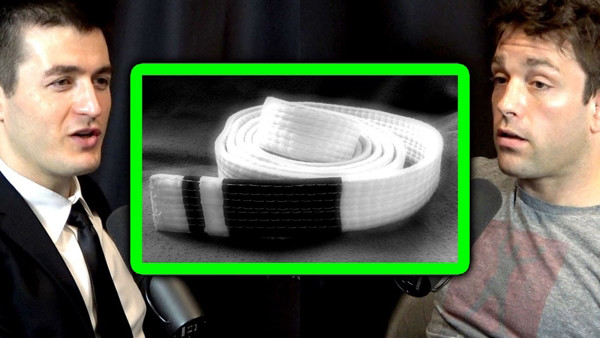Starting Jiu-Jitsu

A lot of readers may be familiar with Ryan Hall. Known within the world of mixed martial arts and jiu-jitsu as the “The Wizard” because of his submission skills, Ryan is also well respected because of his intelligence, his humility, and how quickly he rose to the elite level. In only three years, Ryan went from being a white belt to a serious contender in some of the world’s biggest jiu-jitsu tournaments.
As Ryan explains in the below video, a lot of that early success came from having the right mindset when he started taking jiu-jitsu classes. It allowed him to prepare his ego for one of the most mentally challenging aspects of martial arts: You are going to be physically bested by someone. It also allowed him to fixate on a goal, and to keep that goal as a kind of beacon on which he could focus when he was doubting his decision to train jiu-jitsu or feeling unmotivated.
Why or Why Not?
There’s a lot of “there’s only two types of people in the world…” statements that get made, and this post is going to touch on one of them. Believe it or not, it’s not going to divide the world into “people who train jiu-jitsu” and “people who don’t” or “who haven’t” or even the more arrogant “who haven’t…yet.” Instead, the division is based on how people approach opportunity. Some people see the possibility to try something new and they ask, “Why?” Other people ask, “Why not?”
Many years ago, Ryan was on his way to first class at Ronin Athletics in Midtown Manhattan. He didn’t have a background in martial arts or even combat sports, so he wasn’t sure what he was getting himself into. As he approached, he just kept asking himself, “Why am I doing this?”
True, some people who question their decisions too much may be guilty of what Ryan calls “the thinker’s disease,” and may talk themselves out of doing things. They may overanalyze their decisions and find every possible reason why not to do something, and ultimately end up missing out on some opportunities. However, if they have a good answer to the question of “why”, they can remain committed.
For Ryan (who is most certainly a “why” person), the answer kept coming back to self-defense. He wanted to challenge himself physically and become more self-sufficient, and he had decided that jiu-jitsu was the best way to accomplish this. He knew it was going to take time to improve and to become good at jiu-jitsu, but having a clear reason to come to class every day quelled the nagging question of “Why?”
Conversely, there are the people who ask, “Why not?” People who look at opportunity this way are more likely to try new things. They are more likely to take risks and to live by the code of “nothing ventured, nothing gained.” That said, some people who live by this code may be kind of impulsive or suffer from what might be called the opposite of thinker’s disease. We don’t have to give it a name.
Another issue with the “why not” sentiment is that they can oftentimes have difficulties maintaining a commitment. When there are so many opportunities out there to seize, their schedules can get really crowded. As jiu-jitsu is a serious commitment, this can become a problem.
Growing Pains
As Ryan notes, another thing to keep in mind when you begin training jiu-jitsu is that you will need to leave your comfort zone, especially if you are new to martial arts. One may think the biggest hurdle to getting used to training jiu-jitsu involves physical pain. This is not true. Physical pain is certainly part of any combat sport, and it will occasionally hurt when you practice technique or spar with a partner. However, the blow to your ego when you are bested in a one-on-one physical contest can be more of a shock.
“You are taking a leap of faith into a world where you are going to be a tiny fish, and you have to hope that the people who are guiding you on that journey will try to help you,” Ryan says in the above video when talking about instructors. They will put you through difficult experiences, but you need to trust that this is part of a process that will ultimately make you better.
Training jiu-jitsu will hurt. It will hurt emotionally, and it can hurt physically. However, it will give you more confidence, it will make you more capable of defending yourself, and it will help you become stronger both mentally and physically. Acknowledging that growth is not always easy and maintaining focus on your end goal will not only help you manage expectations. It will also make your early jiu-jitsu experience better.

